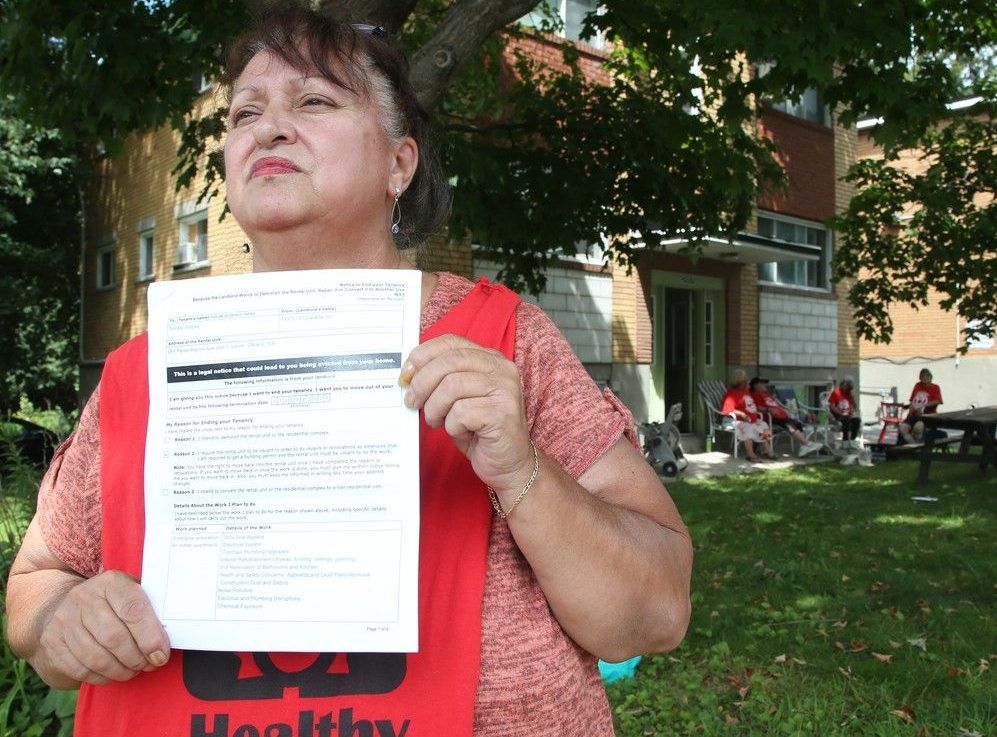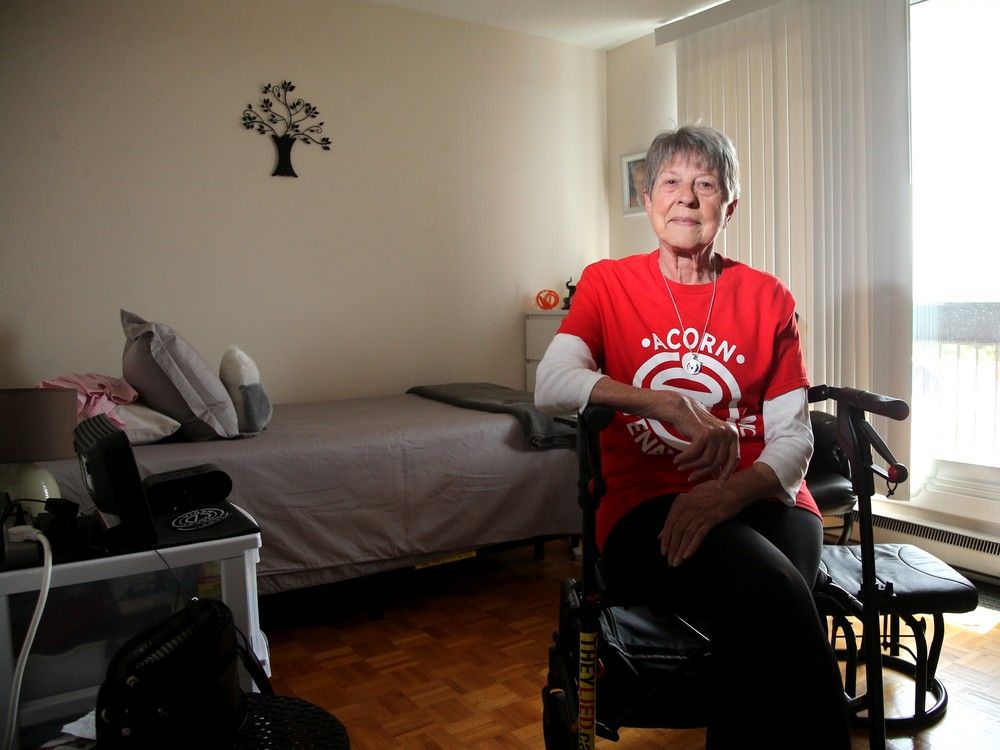When Nelda Giroux received an N13 eviction notice from the landlord of her west-end apartment building last summer, citing
the need for renovations
, she knew
she had no choice
but to fight it. Otherwise, she says, she would have ended up on the street.
“At my age, I didn’t want to be homeless.”
Giroux, who is 73, suffers from rheumatoid arthritis and uses a walker. She gets by on small pensions, but the rent she pays for her tiny 500 square foot studio apartment and the high cost of groceries and other necessities stretch her budget. She recently sold her car to save money. A significant rent increase would leave her with no options, she says.
“I could have lived in my car, but I got rid of my car,” she said.
Residents of her building fought and won the right to stay in their building, joining the tenants’ rights group Association of Community Organizations for Reform Now (ACORN). The organization advocates for tenants’ rights and has campaigned for
policies to prevent illegal renovictions
– such as when a landlord issues an eviction notice, saying extensive renovations are needed, and then puts the unit on the market at a higher rent, whether or not the renovations have been completed.
But Giroux is still nervous that a possible rent increase could eventually force her out.
The Ottawa senior is far from alone.
When a 91-year-old Toronto man was evicted from his apartment earlier this summer with no place to go, many people were shocked. But those who advocate for elderly tenants were not surprised.
Some seniors, like Giroux, are being targeted for eviction by landlords, say advocates, largely because they are long-term tenants and paying lower than market rent. If they lose their homes, they are likely to be disproportionately harmed. Many are on limited incomes.
“The profile of someone who gets renovicted is that they are long-term tenants, so they are generally older people,” said Somerset Ward Coun. Ariel Troster. She put forward a motion to direct city staff to develop a bylaw that would crack down on landlords who unlawfully evict their tenants to renovate, demolish or convert the unit for another use. City council approved the motion in January.
Stan Kuperschmidt, a social worker who works in Troster’s office, said he gets up to a call a week from a senior facing eviction or other housing issues.
Renoviction, he said, “is just the tip of the iceberg” when it comes to the pressure some seniors in rental housing are facing. “A lot of seniors are getting pushed out, not just for renovictions but through various legal mechanisms.”
In one case, he said, a couple — both cancer survivors — were behind a month on their rent and being pressured to leave. The city has an emergency fund for such situations and legal services helped get them back on track and in their unit. In another case, a senior sold all her furniture in response to pressure to leave, assuming she would end up in a homeless shelter.
Kuperschmidt said many people he has spoken to are terrified and exhausted.
A recent report from the Council on Aging of Ottawa noted that a homelessness survey done in 2024 found that more than 22 per cent of respondents experiencing homelessness were over 50, and nearly 12 per cent of respondents reported becoming homeless for the first time between the ages of 50 and 64.
“To protect renters from increasing housing costs, the City of Ottawa must pass an anti-renoviction bylaw, especially for older renters who are more likely to experience a significant increase in the rent paid for their current or next home,” wrote the Council on Aging of Ottawa.
The City of Ottawa is currently seeking input on a Rental Renovation Licence By-law, “to ensure tenants are not unfairly displaced under the pretense of repairs or renovations,” according to the city.
The proposed by-law would require landlords to prove that tenants must vacate for legitimate work, according to the city. Final recommendations are expected next spring.
Troster noted that renoviction notices have decreased dramatically in other Ontario cities that have adopted similar bylaws.
The Council of Aging in Ottawa also wants the province to follow the lead of Quebec and add special protection for seniors. In 2016, the Quebec National Assembly passed a law that forbids landlords from repossessing a dwelling or evicting a tenant who is 70 or older, has occupied the residence for at least 10 years and whose income would qualify them for low-rental housing. The landlord can only repossess if they or the person moving in is 70 or older.
Both Troster and the Council on Aging say the province needs to enforce its own bill protecting tenants.
“If an older adult is displaced due to a renoviction, their options become severely limited. They may be forced to seek emergency shelter services, move into unaffordable housing that places them in core housing need, depend on social networks for support, or endure lengthy wait times to access social housing,” wrote the Council on Aging.
Giroux, meanwhile, said she wants to continue to fight to protect the vulnerable who are at risk of losing housing they can afford.
“I have been put in this world to do something. I am speaking out for all elderly people who are going through the same thing that I am.”
A person answering the phone at the building’s management office said she could not provide any information about the landlord’s reason for the N13 notices, nor could she suggest anyone who could.

Debbie Staples, 64, has also fought a renoviction notice. She led a campaign to fight the eviction notices for her and other tenants of two low-rise buildings in Vanier.
Last summer, she received an N13 notice to vacate her studio apartment because it needed extensive renovations. She has lived there for more than 18 years.
Staples receives disability benefits and was already stretched beyond what she could afford. Despite paying just over $600 for her small studio apartment, she was relying on the food bank at least once a month to get by. She knew she would not be able to afford even a smaller apartment, despite the offer of a $5,000 payout to residents willing to leave.
“If I got evicted, the mailman would have to deliver my mail to my car, because that is where I would have ended up.”
Staples said some residents left, but most remained and, with the support of ACORN, the landlords backed down. Like others in her situation, she fears she could face more pressure to leave.
Staples said she has seen evidence of some landlords targeting the elderly, especially because they have been living in their units the longest.
“They want to renovict so they can top up their rent,” she said.
Staples’ landlord has denied that the situation at the Vanier buildings amounts to a renoviction.
The two buildings need between $200,000 and $400,000 of work,
he told the Citizen’s Joanne Laucius
. “The property is falling apart. The tenants should not be living under those conditions,” he said.
Still, for older adults, the fear of eviction at a time when rents have been steadily increasing is an ongoing stress.
“It is nerve-wracking,” said Giroux. “I lost weight and my arthritis is worse because I am so stressed. We need people to understand what we are going through. The City of Ottawa has to do something. Do they want all of us on the street? Is that what they want?”
Related
- Ottawa is contemplating an ‘anti-renoviction’ bylaw. This is how it could work
- Renoviction bylaw would be costly, City of Ottawa feasibility report says



